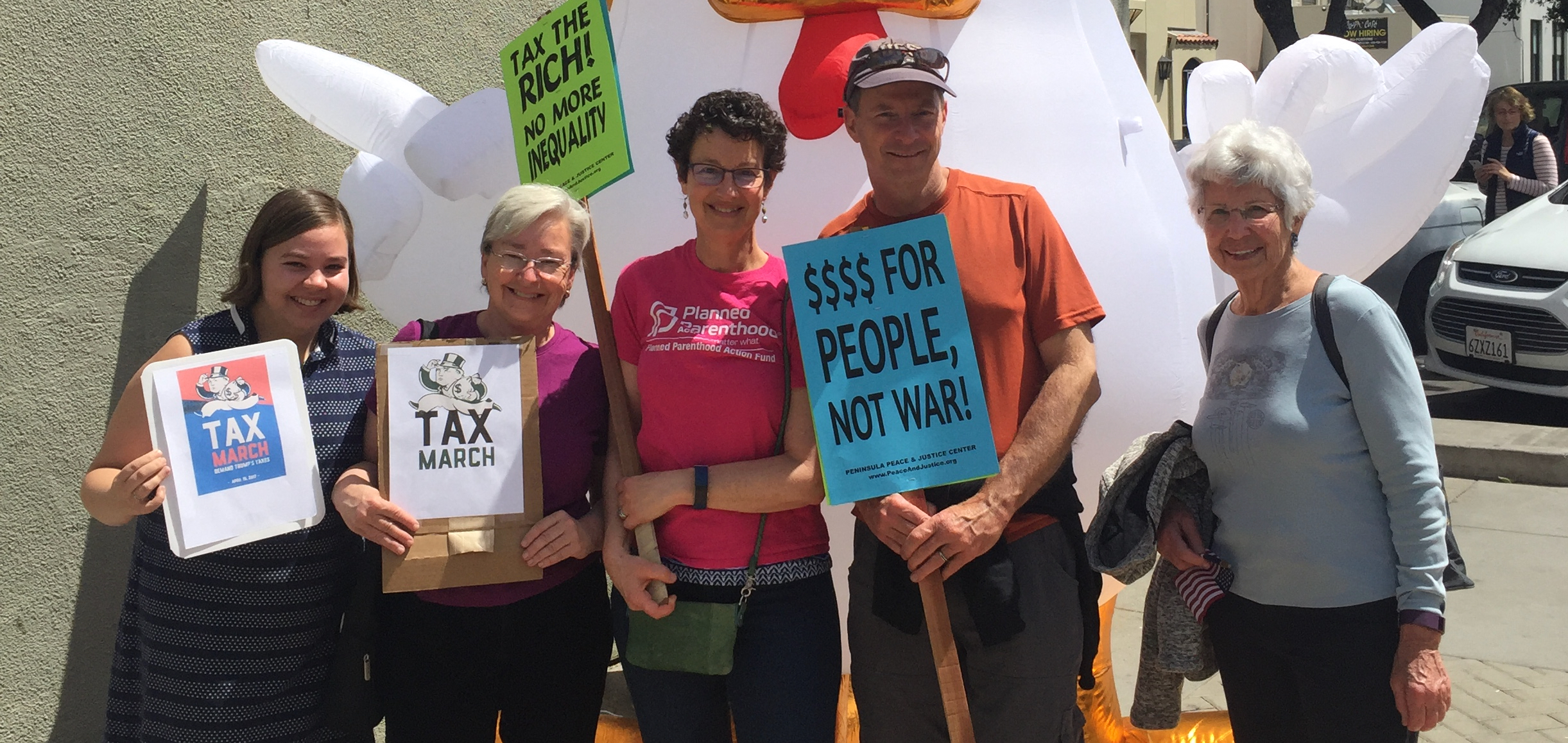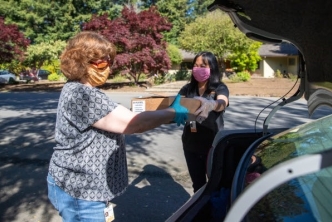
In conversation with Karen Grove
Karen Grove is a Magnify Pledger, Chair of the Grove Foundation, and President of the Grove Action Fund. The Grove organizations support reproductive health and justice, immigrant and refugee legal services, climate justice, civic and political engagement of the “New American Majority,” and safety net services in our community. Grove assets are mission-aligned, and their team aspires to infuse all of their work with a drive toward racial justice. We recently sat down to talk with Karen about taking a portfolio approach to saving the world.
Photo caption: Karen (center) with #FriendsoftheResistance, Zoë and Celeste, husband, Julian and mom, Eva, at the #ShowUsYourTaxes Tax March in Palo Alto.
How do you approach your philanthropy, across all the different vehicles you use to create impact?
We’re using philanthropy as a way to build democratic power by intentionally funding the most marginalized communities to lead the work. In philanthropy, we tend to fund people we know and trust, who talk like us and write like us. As a result, we tend to invest in only a sliver of the brilliant ideas that are out there.
Those of us who have concentrated power and wealth HAVE to share it. We need to shift power from those of us with money to the people working on solving the problems they face everyday. We need to enfranchise and engage marginalized communities so they can focus on what’s important to their community. My understanding of the value of a policy may be skewed until I’ve listened in-depth to the people most directly affected by it.
What advice do you have for someone who wants to give in the most impactful way possible?
Give your money to people who are impacted by the problems you want to solve. Give with consistency and without direction, that is: multi-year unrestricted funding. And be generous! For example, women of color organizing for reproductive justice accomplish so much more with the scraps we throw at them than mainstream national orgs do, but that’s not a valid reason to just throw scraps at them.
People object that they don’t want to be too big a component of an organization's budget, but that’s not equity...that’s not even equality—it’s negative equity. Think about grant size in terms of equity and diversifying the portfolio and balancing it. Bring the smaller organizations up to par. Since 90% of philanthropy is not granting in an equitable way, try harder—overweight your investments in underrepresented groups.
Take a portfolio approach to saving the world: invest in a diversity of strategies. Be the contrarian investor: invest more heavily in strategies that have unrecognized value. Organizing led by those most impacted by oppression—such as people of color, women and trans people, Native people, formerly incarcerated, disabled, immigrants, young folks—are the asset that is undervalued. Invest in them. Our future depends on it!
Why did you create the Grove Action Fund as a 501(c)(4) [the IRS designation for social welfare organizations, which—unlike c(3) organizations—are allowed to participate in politics]?
Achieving systemic change will require political power, which means (c)(4) and PAC [Political Action Committee] money, given in the same way—unrestricted, multi-year, to local groups led by people who have lived experiences with the problems we want to solve.
A lot of the problems philanthropy is trying to solve require strong “small d” democratic political solutions. When 20 kindergarteners are gunned down and Americans overwhelmingly agree that we need sensible gun laws and there is no political action, it is clear that we need stronger “small d” democratic power. When a few political leaders try to make it harder for Americans to vote by mail or in an efficient, safe way in-person in the midst of a deadly pandemic, it is clear that we need stronger “small d” democratic power. Ditto climate change, white supremacy, and police violence (and lack of accountability). Polls indicate that citizens want action, but our elected representatives aren’t representing our interests. Having a (c)(4) allows us to fund policy change.
Tell us about funding the New American Majority.
In 2016, Grove Foundation added a Civic Engagement program to increase civic and voter engagement among the “New American Majority” (NAM)—young voters, voters of color, voters with low incomes, voters who have been incarcerated, and Native voters—which is a large and largely non-white group that has been targeted by racist policies meant to disenfranchise them, such as voter suppression and gerrymandering.
When affected communities have the resources to organize and address these problems, we see more democratic and more prosperous results for everyone. Look at the impact of the NAM vote in Arizona, which is the result of a decade of organizers working to ensure that everyone was registered and signed up to vote by mail; or the multi-racial coalition that galvanized NAM voters to shatter voter turnout records despite egregious voter suppression efforts in Georgia. Both states helped to usher out a would-be autocrat who sought to retain power through violence.
Can donors access all the tools in the toolbox without forming their own (c)(4)?
Setting up the Grove Action Fund as a 501(c)(4) was a big undertaking, but there are other ways to access all the tools in the toolbox: i.e. (c)(3), (c)(4), and PAC funding. You can join a donor collaborative and pool resources. Clarity of personal values and long-term philanthropic strategy facilitate funder and organizing collaboration, sharing power in terms of unrestricted multi-year funding, and achieving big outcomes. Find a collaborative you trust, add water [i.e. money] and watch things grow.
Way to Win is very progressive, led by women of color and building power in the South and Southwest among the New American Majority. They’re investing in a narrative that includes race and class and promotes a powerful vision of the future we can build if we work together.
Groundswell Fund [a 501(c)(3) where I am a Board member] and Groundswell Fund Action [their sister 501(c)(4)] also help donors move money to the grassroots organizers who are innovating and changing the world through the lens of reproductive justice (the issue that inspired my activism), birth justice, and Black and trans liberation.
In 2020, I took everything I’d earned in the stock market [a substantial amount of money] and gave it all to Way to Win and Groundswell funds, to save our democracy. My stance was: I trust you, I know your values, you’ve done your analysis and shared it, and now I’ll give you my money to make that a reality.
Even donors who are politically conservative must find ways to protect democracy, fight white supremacy and mitigate the climate catastrophe that are aligned with their politics...or set their politics aside and resource the people who are best equipped to shape a positive future for all of us.
If someone is hesitant to give to a (c)(4) because there’s no tax deduction, I would challenge them to consider if the tax deduction is truly the only reason they give to charity. If they can’t get past that psychological barrier, my suggestion is to decide what amount they would donate if there was a tax deduction, subtract their effective tax rate, and donate the remainder to the (c)(4) (e.g. What would be a comfortable tax-deductible $10,000 donation, minus a ~30% charitable donation tax deduction, might suggest a $7,000 donation to a (c)(4)).
People are sometimes hesitant to donate to a PAC because the names of donors are disclosed. Examine your values. If you’re not comfortable having your name exposed, maybe you’re not doing the right thing.
I hope that more funders will support year-round community-based grassroots organizing and civic engagement work, so we can continue to build power for all people—not just the privileged and wealthy. That means giving multi-year, unrestricted funding to local groups led by people who have lived experience with the problems we want to solve, in the form of (c)(3) funds, but also and importantly, for those who can, with (c)(4) and PAC dollars. We also need to fund the necessary infrastructure, following the lead of those on the ground.
What’s on your essential reading list?
We need to challenge whiteness and concentration of power. Essential reading for every philanthropist includes:

